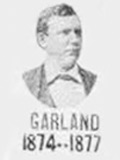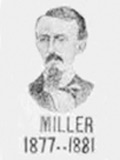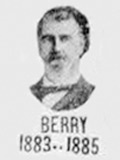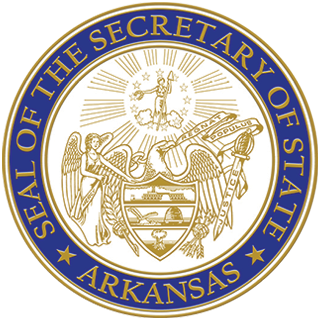State Governors 1874-1885
State Governors 1874-1885
Augustus Hill Garland
 Born: June 11, 1832, in Tipton County, Tennessee
Born: June 11, 1832, in Tipton County, Tennessee
Died: January 26, 1899, in Washington, D.C.
Buried: Mount Holly Cemetery, Little Rock
Served: 1874-1877
Arkansas's twelfth governor was born in Tennessee and graduated from St. Joseph's College, Bardstown Kentucky, in 1849. He was admitted to the Arkansas Bar in 1853. Garland was a delegate to the 1861 Secession Convention and to the Provisional Congress. He served in the Confederate States' House of Representatives from 1861 to 1864 and the Confederate Senate from 1864 to 1865. In 1867 Garland was elected to the U.S. Senate, but was not allowed to take his seat because Arkansas had not been readmitted to the Union. He served as deputy secretary of state, supported the 1874 Constitutional Convention and was elected Governor of Arkansas in 1874. During his single term, he was faced with the state's financial problems, which he substantially reduced by the time he left office. He implemented legislation that led to the creation of the Branch Normal College, where black teachers were trained. He also advocated financial support for schools for the blind and deaf and led the effort which resulted in the award-winning Arkansas pavilion at the 1876 Centennial Exposition in Philadelphia. Garland did not run for re-election in 1876, but was elected to the U.S. Senate in January 1877. He served until March 1885, when he resigned his seat to become U.S. Attorney General, a position he held until 1889. Augustus H. Garland died on January 26, 1899 while arguing a case before the Supreme Court; he is buried at the Mount Holly Cemetery, Little Rock, Arkansas.
William Read Miller
 Born: November 23, 1823, near Batesville, Arkansas Territory
Born: November 23, 1823, near Batesville, Arkansas Territory
Died: November 29, 1887, at Little Rock, Arkansas
Buried: Mount Holly Cemetery, Little Rock
Served: 1877-1881
Miller, the first native Arkansan elected governor, studied law and entered politics in 1848, when he was elected clerk of Independence County. He served as clerk until 1854, and then was appointed state auditor. He was re-elected in 1858, 1860, 1862, and again, in 1874. In 1876 Miller was elected Arkansas's 12th governor and won a second term in 1878. During his tenure, he demonstrated a strong commitment to public education and fought for programs that addressed the state's financial problems. His reluctance to reverse jury-determined death sentences earned him the sobriquet of "the hanging governor." With his support, the Legislature enacted measures to fund maintenance of the State Blind Asylum and the Arkansas Industrial University. His personal honesty and insistence on sound accounting practices led him to oppose the repudiation of much of Arkansas's bonded indebtedness by adoption of the so-called "Fishback Amendment." Passage was delayed, due to opposition from Miller, former governor Garland and other prominent fiscal conservatives, although the bonds were ultimately repudiated. Miller left office on January 13, 1881, and served as the deputy treasurer of Arkansas from 1881 to 1882. In 1886 he was elected state auditor and died late in the following year.
Thomas James Churchill
 Born: March 10, 1824, near Louisville, Kentucky
Born: March 10, 1824, near Louisville, Kentucky
Died: May 14, 1905, at Little Rock, Arkansas
Buried: Mount Holly Cemetery, Little Rock
Served: 1881-1883
Thomas James Churchill, a native of Kentucky, graduated from St. Mary's College in Bardstown in 1844 and studied law at Transylvania University in Lexington. After serving in the Mexican War, he migrated to Arkansas in 1849, married the daughter of Senator Ambrose Sevier and took up farming near Little Rock. He was appointed postmaster of Little Rock in 1857, serving until 1861. During the Civil War Churchill raised a regiment of cavalry for the Confederacy and in battle distinguished himself by his combination of bravery and competence. After the war he returned to law, farming and politics: a Democratic supporter of Elisha Baxter, Churchill was elected state treasurer, serving from 1874 to 1880. In 1880 he was elected Governor of Arkansas. During his term, regulations were enacted for the practice of medicine and surgery and a State Board of Health was established. Funds were approved for an insane asylum and for the construction of a new school at Pine Bluff, and short-line railroad freight and passenger rates were regulated. Several controversies, however, marred Churchill's tenure in office. In 1881, political violence in Perry County led Churchill to direct militia to restore order there, a highly unpopular move. Also, during its 1881 session the legislature appointed a special committee to audit the records of Churchill's tenure as state treasurer. The committee found a shortfall in the state funds, and a lawsuit was brought against Churchill. He was ordered to repay the missing money. After leaving the governor's office, Churchill retired from public life, farming and remaining active in Confederate veterans' organizations.
James Henderson Berry
 Born: May 15 1841, in Jackson County, Alabama
Born: May 15 1841, in Jackson County, Alabama
Died: January 30, 1913, at Bentonville, Arkansas
Buried: City Cemetery, Bentonville
Served: 1883-1885
James Berry moved with his family to Arkansas in 1848, where he was educated in local schools. In 1861 Berry enlisted in the Confederate army, served as second lieutenant, was wounded, and lost his right leg in the battle of Corinth, Mississippi. After the war, Berry taught school, read law and entered politics: he was admitted to the state bar and was elected to the state House of Representatives in 1866, 1872 and 1874. In 1882 he was elected governor. During his tenure the state reduced its indebtedness, short-term loans were repaid, and some bonds were retired. Berry also pressed for collection of claims against former state officials, including his predecessor, Thomas Churchill. A racial moderate by the standards of his time, Berry personally intervened to prevent the lynching of several African-American Howard County farmers accused of murdering a white farmer. Also during his administration, the State Hospital for Nervous Disease was established and the Arkansas Bar Association was chartered. In a less progressive development, the "Fishback Amendment" was submitted to the voters in 1884 and was ratified as Constitutional Amendment 1; under its terms the state repudiated general revenue, railroad aid and levee construction bonds sold during Reconstruction. Berry did not run for re-election and left office in January 1885, only to be selected in March to fill the vacancy created in the U.S. Senate when Senator Augustus Garland resigned. He occupied the Senate seat for the next 22 years. In 1910, he was appointed commissioner of the Arkansas History Commission and was given the assignment to mark all the graves of Confederate soldiers who had died in Union prisons. Berry completed this task in December 1912, and died the following January in his home in Bentonville.




